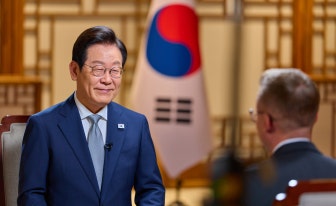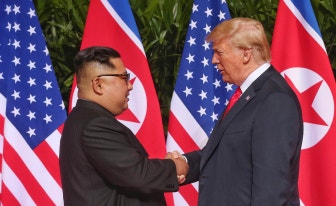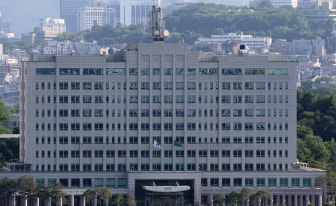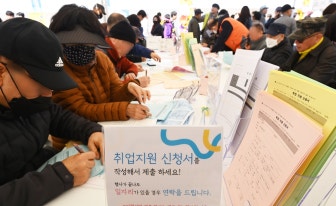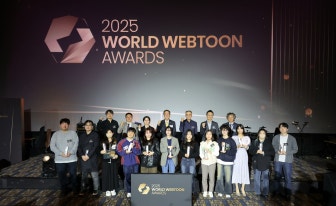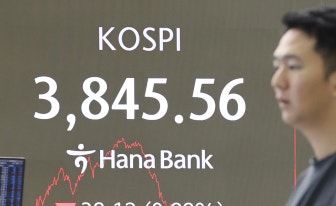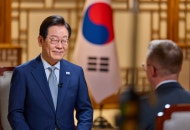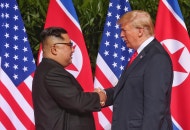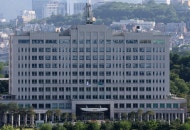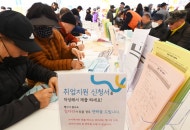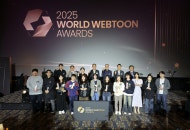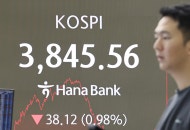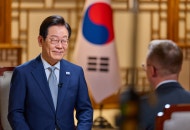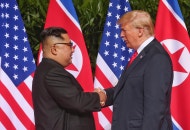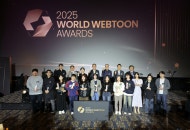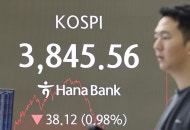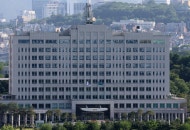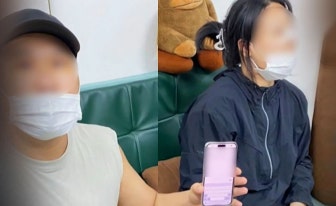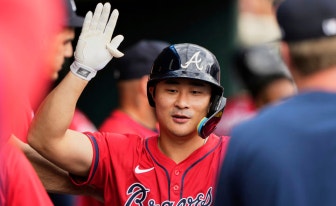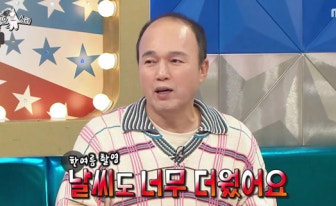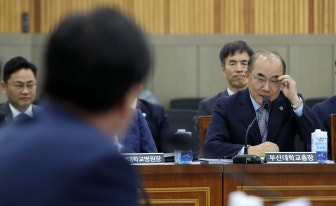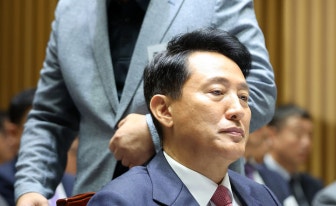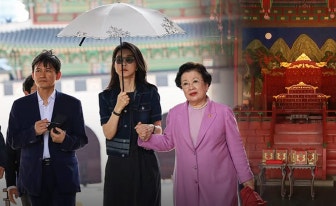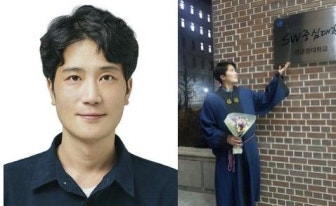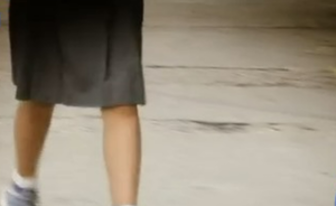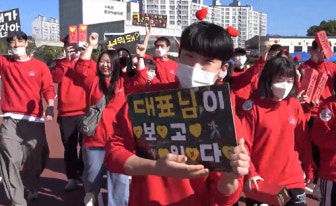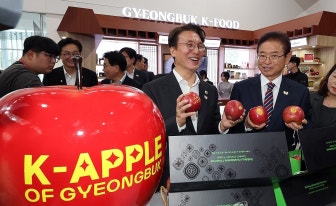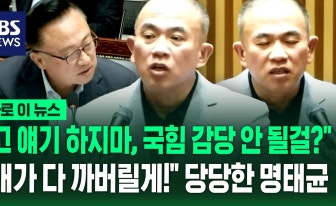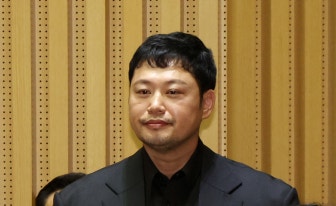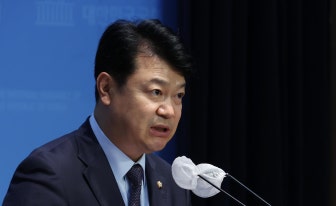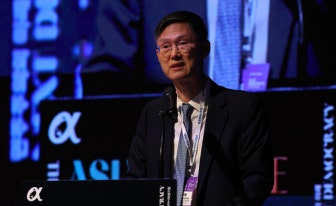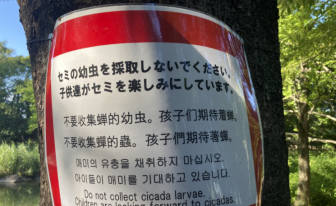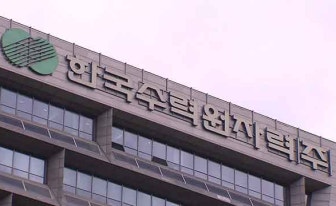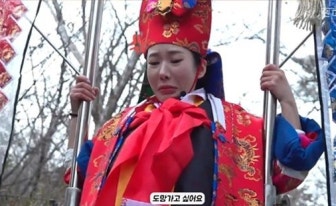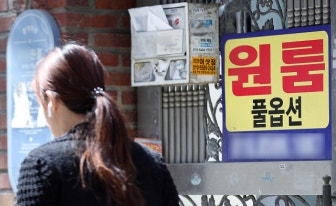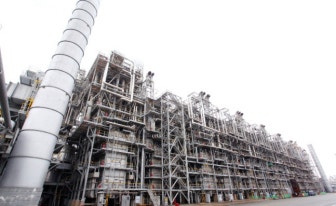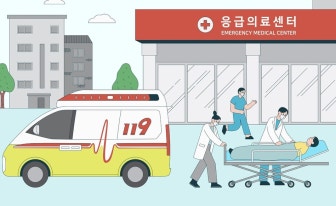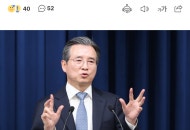| Korean President Lee Jae Myung (left) shakes hands with Nvidia CEO Jensen Huang (right) as SK Chair Chey Tae-won (second from left) looks on during a reception for the Korea-US Business Roundtable at the Willard Hotel in Washington on Monday. (Yonhap) |
At a downtown Washington hotel on Monday, anticipation ran high as leading Korean and US executives assembled for the “Korea-US Business Roundtable: Manufacturing Renaissance Partnership.”
Samsung Electronics Chair Lee Jae-yong embraced Nvidia’s Jensen Huang in a spirited greeting, while Hyundai Motor Executive Chair Chung Euisun, SK Chair Chey Tae-won and LG Chair Koo Kwang-mo exchanged handshakes with Carlyle co-founder David Rubenstein and other US tech and finance executives.
When President Lee Jae Myung finally entered the reception hall, dressed in a red tie after an hour’s delay due to the summit meeting with US President Donald Trump, the room erupted in applause.
US business leaders presented him with a baseball jersey emblazoned with “JM LEE,” and participants gathered for a group photo before moving on to the roundtable session.
In his keynote, Lee invoked history to underline the stakes of the partnership. “The foundation of our alliance is trust and the best way to deepen that trust is through economic exchange,” he said.
“Just as US support helped Korea rise from the ruins of war to become a manufacturing powerhouse, it is now our turn to contribute to America’s industrial revival.”
Lee cast Korea as a vital partner in supporting the industrial ambitions of the US.
“Korea holds the world’s top capabilities in shipbuilding, semiconductors, batteries and nuclear energy. We are ready to be America’s most trusted partner in rebuilding its manufacturing strength,” Lee said.
“Our alliance was born in wartime, but its future will be defined by innovation, technology and shared prosperity.”
The event drew nearly 40 top corporate leaders, including Hanwha Vice Chair Kim Dong-kwan, Korean Air’s Walter Cho, Naver CEO Choi Soo-yeon and Doosan Enerbility Chair Park Gee-won, alongside US counterparts such as Applied Materials CEO Gary Dickerson and Boeing President and CEO Stephanie Pope.
Federation of Korean Industries Chair Ryu Jin underscored the scale of Korea’s ambitions. “Korean companies are planning $150 billion in new investments in the US — not just to expand factories, but to build a shared future in AI, semiconductors, biotech and strategic industries like shipbuilding and nuclear power,” he said.
“The US leads with innovation and core technologies, while Korea excels at advanced manufacturing. Together we can unlock unmatched synergy.”
He added that cooperation should extend beyond facilities. “This is not just about building factories. It is about building a lasting ecosystem of talent, technology and supply chains between our two nations,” Ryu said.
US Commerce Secretary Howard Lutnick echoed the sentiment, stressing that the partnership was evolving beyond traditional trade.
“Today’s US-Korea business partnership is no longer about simply trading goods. It’s about shaping the future together in semiconductors, clean energy, digital technologies and more,” he said.
Lutnick praised Korea’s role in the US economy. “Korean companies are investing billions in US plants and labs, creating jobs and strengthening supply chains. At the same time, American firms are bringing technology and opportunities to Korea. This is a two-way street,” he said.
“For seventy years, our alliance began with defense, but today it is expanding into every corner of the economy. That reciprocity is what makes this partnership resilient.”
| From left: LS Group Chair Koo Ja-eun, Lotte Vice Chair Kim Sang-hyun, CJ Chair Lee Jae-hyun, GS Group Chair Huh Tae-soo, Carlyle Co-Chair David Rubenstein, Naver CEO Choi Soo-yeon, Federation of Korean Industries Chair Ryu Jin, Samsung Electronics Chair Jay Y. Lee, Hyundai Motor Chair Euisun Chung and Korea Zinc Chair Choi Yun-beom pose for a photo ahead of the “Korea-US Business Roundtable: Manufacturing Renaissance Partnership” at the Willard Hotel in Washington, on Monday. (Yonhap) |


